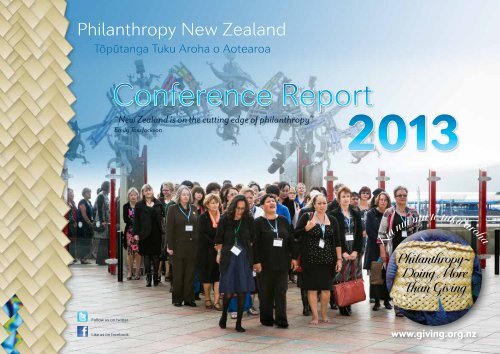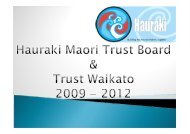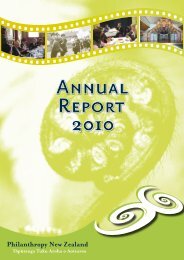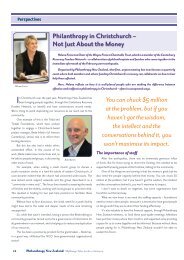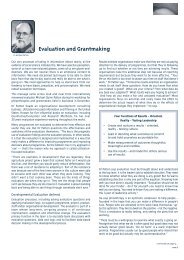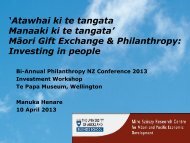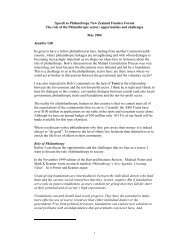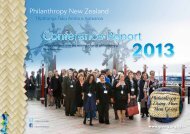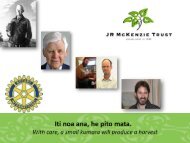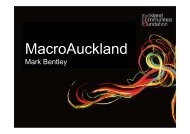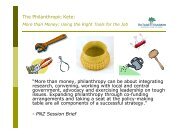Read our Conference Report online. - Philanthropy New Zealand
Read our Conference Report online. - Philanthropy New Zealand
Read our Conference Report online. - Philanthropy New Zealand
You also want an ePaper? Increase the reach of your titles
YUMPU automatically turns print PDFs into web optimized ePapers that Google loves.
<strong>Philanthropy</strong> <strong>New</strong> <strong>Zealand</strong><br />
Toputanga Tuku Aroha o Aotearoa<br />
<strong>Conference</strong> <strong>Report</strong><br />
“<strong>New</strong> <strong>Zealand</strong> is on the cutting edge of philanthropy”<br />
Emily Tow Jackson<br />
2013<br />
Kia nui atu te tuku aroha<br />
<strong>Philanthropy</strong>~<br />
Doing More<br />
Than Giving<br />
Follow us on twitter<br />
Like us on facebook<br />
www.giving.org.nz
Contents<br />
2<br />
3<br />
4<br />
5<br />
7<br />
8<br />
9<br />
10<br />
11<br />
12<br />
13<br />
14<br />
15<br />
<strong>Conference</strong> sponsors<br />
From the <strong>Conference</strong> Chair & Chief Executive<br />
Emily Tow Jackson & Stephen Tindall<br />
Impact<br />
Media<br />
Kevin Murphy & Tim Brodhead<br />
Albert Ruesga & Che Wilson<br />
Workshops<br />
Ian Narev & Bronwen Golder<br />
Philanthropists’ lunch<br />
Comments<br />
Attendance<br />
Ratings<br />
Matt Dagger, Kaibosh Manager<br />
Congratulations to Wellington charity, Kaibosh Food Rescue, which delivered 178 meals made from<br />
unused conference food to the Home of Compassion Soup Kitchen, the Wellington Night Shelter and<br />
Pablo’s Art Studio in a successful first-time collaboration with a large-scale venue like Te Papa.<br />
“I was really impressed with the commitment to sustainability – was really<br />
proud of what you did with this and think that it would be great<br />
to look at other ways that <strong>Philanthropy</strong> <strong>New</strong> <strong>Zealand</strong> could ‘live’ its values<br />
through the way it carries out its functions.” Survey feedback<br />
<strong>Philanthropy</strong> <strong>New</strong> <strong>Zealand</strong> would like to gratefully acknowledge the support from sponsors of this year’s conference:<br />
We would also like to thank: the JR McKenzie Trust, ASB Community Trust and The Tindall Foundation, which have all provided assistance<br />
with speakers' travel costs.<br />
<strong>Conference</strong> committee and<br />
<strong>Philanthropy</strong> <strong>New</strong> <strong>Zealand</strong> staff<br />
A special thanks to Signify web development company, which has donated many h<strong>our</strong>s of skilled work on <strong>our</strong> conference website.<br />
Plus, thanks to Siobhan Bulfin of Goalpost and Helen Baxter of Mohawk Media, who provided social media support.<br />
Thanks also to the conference committee for the many extra h<strong>our</strong>s spent on conference planning:<br />
Keynotes and presentations available now<br />
at www.giving.org.nz<br />
A short video clip featuring interviews from the conference<br />
is available HERE<br />
With thanks to June Brodie for her camerawork.<br />
All photography by Paul Fisher unless otherwise specified.<br />
Design by Bunkhouse graphic design ltd<br />
Edited by Mary Longmore<br />
Jennifer Gill (Chair), Alison Taylor, Chloe Harwood, Moi Becroft and Karyn McLeod, all from the ASB Community Trust,<br />
Rongo Kirkwood of Trust Waikato, Kate Tindall of the Tindall Foundation, Kim McWilliams of the Auckland Medical Research<br />
Foundation, Carol Melville of the Otago Community Trust, Mark Bentley of the Auckland Communities Foundation,<br />
Helena Francis of the Wayne Francis Charitable Trust, Terri Eggleton of Baytrust and to John Prendergast of the<br />
Community Trust of Southland for his superlative MC duties.<br />
With much appreciation also to <strong>our</strong> volunteers: Sharon Leamy, Adrienne Thomson, Ishani Noble, Alicia Bencivenga<br />
Rachel Tumminello and Michelle Wanwimolruk for their invaluable contribution over two days.<br />
Simon Bowden from the Arts Foundation and the Swing Gigolos<br />
entertained conference-goers. Photo by Matt Silcock, Descent Photography<br />
2
from<br />
&<br />
<strong>Conference</strong> Chair<br />
I left this year’s conference buzzing, with the exhilarating sense<br />
<strong>our</strong> sector is at the crest of a wave of enthusiasm, engagement<br />
and new ideas that has been building over recent years.<br />
The hallways of Te Papa were sizzling with energy as people<br />
made connections across countries, generations and sectors.<br />
And that was in between the plethora of workshops and<br />
often visionary speakers, who have dedicated their lives to<br />
something bigger than themselves.<br />
From the extraordinary Kiwi conservationist Bronwen Golder,<br />
who described her big picture approach to transforming how<br />
we perceive <strong>our</strong> oceans, to Tim Brodhead’s poignant plea<br />
for creative action to ensure humanity’s survival, this year’s<br />
conference was filled with optimism, innovation – and coolheaded<br />
advice.<br />
While we face enormous social, economic and environmental<br />
challenges, it would appear there are plenty of thoughtful<br />
grantmakers, young people and social entrepreneurs who are<br />
prepared – and equipped – to take them on.<br />
Philanthropists today have become more strategic than ever<br />
before. For me, this year’s conference reinforced that this<br />
high-engagement, mission-driven approach is one of the most<br />
effective ways to make a difference – which is what we are all<br />
trying to do.<br />
Ka kite ano<br />
Jennifer Gill<br />
Chief Executive, ASB Community Trust<br />
Tena koutou friends<br />
Chief Executive<br />
“Fly high, or in the words of a Maori proverb:<br />
Whaia te iti kahuranga ki te tuahu<br />
koe me he maunga teitei<br />
Aim for the highest cloud so that if you<br />
miss it, you will hit a lofty mountain.”<br />
“A coming of age”; “a buzz in the hallways”; “a wave of<br />
enthusiasm” – these are but a taste of the fav<strong>our</strong>able<br />
comments made about the philanthropic sector in <strong>New</strong><br />
<strong>Zealand</strong> at <strong>our</strong> conference. I agree.<br />
I have the same sense that<br />
we are at a tipping point.<br />
With a wealth of experience, knowledge and innovative<br />
thinking alongside the money, we have the power to transform<br />
more lives, more deeply than ever before.<br />
I’m ambitious, both for <strong>Philanthropy</strong> <strong>New</strong> <strong>Zealand</strong> and <strong>our</strong><br />
sector. As Emily Tow Jackson observed, <strong>New</strong> <strong>Zealand</strong> is on<br />
the “cutting edge” of philanthropy. We are small and the field<br />
is relatively new, but this gives us the chance to innovate and<br />
be creative.<br />
Here at <strong>Philanthropy</strong> <strong>New</strong> <strong>Zealand</strong> we are developing new<br />
strategies for connecting philanthropy to need as effectively<br />
as possible. What might this look like? We see five areas of<br />
opportunity:<br />
1<br />
2<br />
3<br />
4<br />
5<br />
Building PNZ as a backbone organisation, with strong<br />
and strategic alliances across philanthropy, business, iwi,<br />
government and community.<br />
Becoming a thought leader, to inform <strong>New</strong> <strong>Zealand</strong> on<br />
how philanthropy can and does contribute ($2.67 billion<br />
in 2011).<br />
Increasing value to <strong>our</strong> members by expanding<br />
professional development, good practice, research,<br />
networks and services.<br />
Creating informed debate on new opportunities, trends<br />
and models to improve social investment with impact.<br />
Advocating and agitating.<br />
We will be seeking y<strong>our</strong> ideas as we develop this strategy.<br />
We brought together:<br />
11<br />
and more than<br />
incredibly insightful keynotes speakers,<br />
including<br />
internationals<br />
70<br />
5<br />
highly talented people from<br />
around the globe to run<br />
24<br />
workshops over<br />
2<br />
days.<br />
This report reveals initiatives and new approaches already<br />
emerging from connections made at <strong>our</strong> conference by the<br />
342 people who attended.<br />
We look forward to hearing of many more.<br />
Hei kona ra – see you next time!<br />
Liz Gibbs<br />
3
speakers“Treating people with unconditional respect,<br />
does actually work.”<br />
Sir Stephen Tindall from The Tindall Foundation<br />
“They inspire me every day to do all that’s in my<br />
power to offer them the opportunities and safety<br />
net that I had and that every child deserves.”<br />
Emily Tow Jackson, from the Tow Foundation, USA<br />
Emily Tow Jackson<br />
Emily spoke powerfully about how today’s generation of philanthropists want to lead social<br />
change, not just write cheques, and that small organisations have the power to achieve this.<br />
Under her leadership, her own family’s Tow Foundation – inspired by the case of brutally jailed<br />
teenager “Emily J” – made the leap into catalytic philanthropy and ultimately led to the successful<br />
transformation of Connecticut’s entire justice system.<br />
“If we were going to not just help 15 or 50 people but whole<br />
communities, we needed to do things differently.”<br />
The board began collaborating with non-profit leaders, government and advocates for legislative<br />
change. Two decades later, thousands of youths receive quality therapeutic care instead of being<br />
jailed and Emily is working to replicate the transformation in <strong>New</strong> York.<br />
“We are not a big organisation, but we have managed to deliver a catalytic impact by being bold,”<br />
said Emily, urging Kiwi grantmakers to do the same.<br />
<strong>Read</strong> Emily’s personal story of how her passion for working with youth began<br />
in <strong>New</strong> <strong>Zealand</strong>, HERE<br />
Hear her on Nine to Noon, HERE<br />
Watch her presentation, HERE<br />
Stephen Tindall<br />
Sir Stephen Tindall spoke about the Tindall Foundation’s move from “pure charity” to deeper work<br />
bringing social change in recent years.<br />
Such projects include growing community foundations, training and employing more Maori<br />
and Pacific people in South Auckland’s health sector and connecting young people to relevant<br />
qualifications and available jobs. Collaboration with others – government and communities – is<br />
key, Sir Stephen said.<br />
“We can’t do it alone. The government can’t do it alone.<br />
It’s about joining <strong>our</strong>selves up and trying to solve problems<br />
that actually exist in this country.”<br />
What has The Tindall Foundation learned?<br />
• Remain flexible, but stick to y<strong>our</strong> road map.<br />
• Be engaged but you are a funder, not a friend.<br />
• Use steering groups and advisory panels. “This works a treat”<br />
with round table discussions of interested parties getting things moving.<br />
• Look for an appetite for change within communities.<br />
• A warm head, cool heart, hard nose and patience.<br />
Asked about the next generation, he suggests parents use the rule of thirds when supplying pocket<br />
money – spend a third, save a third and give a third away:<br />
“Teach kids that you are supposed to share y<strong>our</strong> income with others.”<br />
See Stephen’s presentation, HERE<br />
Hear Stephen’s Radio <strong>New</strong> <strong>Zealand</strong> interview, HERE<br />
“Absolutely standout.” Adrienne Thurston, Hugh Green Foundation, on Emily Tow Jackson<br />
4
impact<br />
You came, you saw, you listened. Now what will you do?<br />
We asked grantmakers what changes are taking place<br />
as a result of the conference.<br />
YOUTH<br />
The Auckland Communities<br />
Foundation’s “simmering”<br />
plans for a youth<br />
philanthropy programme<br />
was given new impetus<br />
by the “amazing” young<br />
people who Skyped from a<br />
Pennsylvania’s Youth Advisory<br />
Committee to talk about how<br />
they raise and give money away, said<br />
Chief Executive Mark Bentley.<br />
“Seeing it in action has motivated me to think, ‘maybe this isn’t a<br />
piece of skunk work that I get someone else to do; it’s actually<br />
something we fold into the main activity of the Foundation and<br />
just crack on with it <strong>our</strong>selves, giving it the appropriate time<br />
and energy.’”<br />
Founder of California’s Harry Singer Foundation, Melvin Kaplan,<br />
plans to take up the Tindall Foundation’s approach to boosting<br />
youth employment, after discussions with Sir Stephen Tindall.<br />
The Youth Employment Initiative works with local councils and<br />
employers to get youths into local jobs by ensuring they get<br />
relevant qualifications at school.<br />
“That’s a great idea for us. We’re having the same problem,<br />
they graduate out of high school, but they are not employed in<br />
any way.”<br />
CROWDFUNDING<br />
Auckland Communities Foundation Grants Manager Kat Stanier<br />
wants to incorporate crowdfunding into its fundraising, especially<br />
for large projects, after attending the crowdfunding workshop.<br />
This year, the Foundation initiated a giving circle and a small “staff<br />
and friends of” fund – two initiatives that could provide them with<br />
the platform on which to explore crowdfunding further, Kat said.<br />
CANTERBURY<br />
Vodafone NZ Foundation Manager Annette Culpan said she<br />
made some great connections with some international keynote<br />
speakers. “I’ve already begun linking in with two of them, to<br />
leverage their knowledge and experience and apply it here in<br />
Aotearoa.<br />
“Plus, I have had feedback from Dr Albert Ruesga on <strong>our</strong><br />
funding strategy in Canterbury, and have a conference call<br />
scheduled with Tim Brodhead on how to approach systemic<br />
social change.”<br />
COLLABORATION & NETWORKING<br />
Recently appointed Chief Executive of <strong>Philanthropy</strong> Australia,<br />
Louise Walsh, said she got the chance to talk to <strong>Philanthropy</strong><br />
<strong>New</strong> <strong>Zealand</strong>’s Chief Executive Liz Gibbs – also newly appointed<br />
– about possibly working more closely together. She said there<br />
is an “exciting opportunity” for these trans-Tasman organisations.<br />
“We’re both new, we’ve both got fresh ideas and I think<br />
you’re going to see us collaborate on a number of areas –<br />
whether it’s research, whether it’s policy space – certainly in<br />
the area of conferences.”<br />
Albert Ruesga, Greater <strong>New</strong> Orleans Foundation<br />
Ingrid Burkett of Australia’s social business consultancy, Knode<br />
Liz Gibbs with Louise Walsh,<strong>Philanthropy</strong> Australia<br />
Photo by Matt Silcock, Descent Photography<br />
5
Volunteer Michelle Wanwimolruk and<br />
Louise Edwards of the Canterbury Community Trust<br />
Margot McCool and Nicky Wilkins<br />
of the Acorn Foundation<br />
Caren Rangi, Eastern & Central Community Trust with<br />
Precious Clark of ASB Community Trust<br />
6<br />
ADVOCACY<br />
Hugh Green Foundation Manager Adrienne Thurston was<br />
particularly influenced by Kevin Murphy’s call to agitate. As a<br />
result, she has been discussing with others in the Canterbury<br />
Recovery Funding Network the need to make a stand to ensure<br />
people are treated equally in Canterbury.<br />
“This is exactly what we should be doing… Making a stand<br />
together.”<br />
CATALYTIC & STRATEGIC PHILANTHROPY<br />
The West Coast Community Trust is reconsidering its approach<br />
to funding decisions after hearing how the JR McKenzie Trust<br />
decided to become more strategic in its funding.<br />
“I thought it was a major change, very c<strong>our</strong>ageous, and it made<br />
me think a lot about how we do things,” said Chief Executive<br />
Angela Keenan. She plans to “plant a little seed” for similar<br />
changes at the Trust’s next strategic review.<br />
Opening talks from Sir Stephen Tindall and US grantmaker Emily<br />
Tow Jackson on how their respective family foundations take a<br />
strategic approach to their philanthropy were a big influence, as<br />
was the chance to network with other Canterbury funders, said<br />
Louise Edwards of the Canterbury Community Trust.<br />
“Canterbury is at a historic point in time, and it’s about<br />
making sure we take up <strong>our</strong> leadership responsibilities and<br />
connect with other funders in a more collaborative way.”<br />
EVALUATION<br />
The Hugh Green Foundation will be doing more evaluation as a<br />
result of the Kate McKegg workshop she attended, said Adrienne<br />
Thurston.<br />
“At the moment we don’t strongly evaluate the real stories.<br />
We look at how many people turned up to that therapy<br />
session, or how many youth are now being mentored. But it’s<br />
what’s different in their lives from going along. It’s not how<br />
many, it’s what happening. So that’s definitely something<br />
we’ll take away.”<br />
MAORI & PHILANTHROPY<br />
The Canterbury Community Trust is also examining how it<br />
engages with Maori community groups, particularly around its<br />
application process, after Chief Executive Louise Edwards saw<br />
Che Wilson’s presentation on Maori and philanthropy. She said<br />
the Trust also planned to work more closely with South Island<br />
Iwi, Ngai Tahu, after meeting a representative at the conference.<br />
STRATEGY & SELF REVIEW<br />
For some, the conference reinforced that they were heading in<br />
the right direction.<br />
“I think it’s really reinforced the direction the Trust is going<br />
in around high engagement & strategic philanthropy: that it<br />
is the way this world is going and that it is the right thing to<br />
do.” Jennifer Gill, ASB Community Trust.<br />
“I think it’s been a reassurance to us that we are on the<br />
right track. We go out there and think ‘are there areas in the<br />
community we can help?” Sir Eion Edgar, Central Lakes Trust.<br />
BUILDING COMMUNITY OVER DINNER<br />
When Trust Waikato’s Chief Executive Bev Gatenby heard<br />
chef Richard Till talk at the 2009 <strong>Philanthropy</strong> <strong>New</strong> <strong>Zealand</strong><br />
conference about two historic community dinners held in the<br />
1800s, she was inspired. F<strong>our</strong> years later the community has<br />
successfully run two large annual events called Dinner @ the<br />
Domain, with the support of Trust Waikato. Bev said she would<br />
“warmly recommend this kind of idea to people.<br />
Bev Gatenby & Richard Till’s talk, HERE
Media coverage has been excellent, particularly from<br />
Radio <strong>New</strong> <strong>Zealand</strong> which featured most keynotes.<br />
Social Media: We used the conference as a launchpad for Twitter and Facebook, curating all conference-related tweets into a wrap up of the <strong>online</strong> conversation<br />
on Storify, HERE<br />
Emily Tow Jackson<br />
Sir Stephen Tindall<br />
Tim Brodhead<br />
Nine to Noon<br />
Weekly cumulative*<br />
audience 227,000<br />
Sunday Morning<br />
with Chris Laidlaw<br />
Weekly audience 192,000<br />
Sunday Morning<br />
with Chris Laidlaw<br />
Great to have so many high calibre speakers presenting on a number of subjects.<br />
It was difficult to decide which workshops to attend. Survey feedback<br />
Kevin Murphy<br />
Ian Narev<br />
Albert Ruesga<br />
Nights<br />
with Bryan Crump<br />
Weekly audience<br />
156,000<br />
The Dominion Post<br />
Average daily readership<br />
235,000 15+<br />
The Christchurch Press<br />
Average daily readership<br />
215,000 15+<br />
plus Sunday Morning<br />
The conference cocktail party also featured in the Sunday Star-Times’ About Town section<br />
*Weekly cumulative audience means the number of different listeners aged 15+ over a week. Nielsen survey 2012 figures.<br />
7
speakers“I don’t think we believe that societies or civilisations<br />
“By breaking out of the traditional quiet mode<br />
of grantmaking, we make <strong>our</strong>selves servants<br />
of the communities that we serve and that’s an<br />
appropriately humble place for us to be.”<br />
Kevin Murphy, President and Chief Executive of the Berks<br />
County Community Foundation<br />
are fated to decay. What we’ve seen, what we believe<br />
is that societies can rise to the challenges they face.<br />
We find ways to renew <strong>our</strong>selves and we develop<br />
new frameworks, new knowledge and we call that<br />
capacity, resilience.”<br />
Tim Brodhead, Senior Fellow, Social Innovation Generation, Canada<br />
Tim Brodhead<br />
8<br />
Kevin Murphy<br />
Kevin called on philanthropists to step into “the rough and tumble business of social change” and<br />
speak up to the powerful on behalf of those who cannot.<br />
He described how the Pittsburgh school district in Pennsylvania was transformed from a<br />
dysfunctional failure into a successful national model after three foundations stood up in 2002<br />
and announced they were halting all grants to the school board until the problems were fixed.<br />
Even more astonishing, this sweeping change was brought about by withholding grants totalling<br />
just US$3.5m a year – a third of a percent of the district school board’s $US1billion budget.<br />
So began a trend of grantmakers taking on hard, public battles on behalf of those they serve – a<br />
trend which can and should continue.<br />
“Irritating and agitating causes us to step out of <strong>our</strong> limited roles<br />
as dispensers of cash and be willing to use <strong>our</strong> moral and<br />
political authority on behalf of those who lack power. It means<br />
sometimes we have to be a pain in the butt.”<br />
See Kevin’s full keynote, HERE<br />
Hear Kevin’s interview on Radio <strong>New</strong> <strong>Zealand</strong>, HERE<br />
A show-stopper – very funny but very very powerful and a<br />
great call to action for us to not sit back on <strong>our</strong> laurels but<br />
really take positions of community leadership.<br />
Auckland Communities Foundation CEO Mark Bentley on Kevin Murphy’s keynote<br />
Warning of the perils of “just muddling through”, Tim called on the philanthropic sector to lead a<br />
major social reorganisation in response to “epochal” global challenges facing the world today –<br />
as it had in past social changes such as the equal rights movement and protection of the planet.<br />
“Material wealth alone does not make a good life. Inequality creates instable societies. We can’t<br />
continue to indulge <strong>our</strong> wants and needs at the expense of future generations needs. All these<br />
things we know”. But can we translate this into practical action?<br />
Collaboration is key – granters and grantees must work together – and more proactive, complex<br />
funding models are needed. But to achieve social transformation, we must create an “ecosystem”<br />
with safe spaces for government, funders and community groups to come together and take risks.<br />
This is starting. In Canada, social innovators are experimenting with social finance, loosening<br />
fundraising rules and building links with universities. Boundaries between public, private and notfor-profit<br />
sectors are increasingly blurred. Change, or social innovation, labs are bringing Nestlé<br />
executives together with African farmers, to discuss global food security.<br />
“That’s the good news, we can change!<br />
And we’re doing so.”<br />
Tim raised the “Pollyanna-ish” point that every cloud has a silver lining: slow growth means less<br />
consumption, paying down debt forces us to live within <strong>our</strong> means.<br />
See Tim’s full presentation, HERE<br />
“Another world is not only possible, but she is on her way.<br />
On a quiet day I can hear her breathing” –<br />
Tim Brodhead quoting Arundhati Roy.
&<br />
Dr Albert Ruesga<br />
Greater <strong>New</strong> Orleans Foundation and Grantmakers for Effective Organizations (GEO)<br />
Che Wilson<br />
Chair of Te Kawai Toro and Ngati Rangi Trust Manager<br />
Loosely basing his talk around the “quiet desperation” felt by many non profit leaders, Dr Ruesga<br />
suggests some approaches to strengthening non profit organisations so they can fulfil their<br />
mission. But sometimes the best thing a funder can do is “leaving them alone” – let them grow!<br />
Che Wilson announced draft research from BERL on behalf of Te Kawai Toro, the Maori committee<br />
within the JR McKenzie Trust. While it was challenging to extract data on Maori-only funding,<br />
researchers estimate 12 percent of all philanthropic funding goes to Maori.<br />
To reach sensitive information about where the biggest needs are among organisations, Dr Ruesga<br />
suggests an anonymous survey. At his Foundation, this research uncovered the fact that 50 percent<br />
of grantees had less than three months reserves and many were living from hand to mouth.<br />
It also found that many non profit leaders are in the job for the first time and may not have all the<br />
skills required to run an organisation – with 75 percent planning to leave within five years due to<br />
burnout, mostly due to stress over fundraising.<br />
“They’re burning out primarily because of money issues… because<br />
they’re not getting the kind of support they need from their trustees<br />
or board of directors.”<br />
But with Treaty settlements only two to f<strong>our</strong> percent of what was taken, even for iwi getting $50<br />
million-plus, it will take roughly 30 years to get to a place where they are able to give.<br />
“So if we want that to increase, then we’ve got to look at other ways of doing this as a country.<br />
“By working together – Maori, the government, philanthropy… we can<br />
start to build the blocks not just for Maori, but to increase production<br />
for <strong>our</strong> country and create a better place to live, Aotearoa.”<br />
Hear Che’s full presentation, HERE<br />
Ways to support include:<br />
• General operating support, ideally multi-year<br />
grants for capacity-building<br />
• Other kinds of capital, such as loans<br />
• Larger grants<br />
• Simplify grant application and reporting<br />
• Support the NGO “ecosystem” by supporting<br />
bodies like <strong>Philanthropy</strong> NZ<br />
Watch Albert’s full presentation, HERE<br />
Listen to Albert on Radio NZ, HERE<br />
Train y<strong>our</strong>self in:<br />
Watch out for transitional moments: such as:<br />
Rules of engagement:<br />
• Organisational life cycles • Moving from all volunteer to staffed organisations • Always do ‘with’ not ‘to’ communities<br />
• Non profit finances<br />
• Appointing a first time executive director<br />
• Be willing to apply to y<strong>our</strong>self the<br />
• Governance & evaluation • Departure of the founder is a “moment of peril”<br />
prescriptions you dole out to others<br />
• Moving to new locations<br />
speakers<br />
9
workshops<br />
With 24 workshops run by more than 70 incredibly talented people over two days – including<br />
several young people who Skyped in HERE to talk about their grantmaking project in Pennsylvania<br />
– there were rich pickings for <strong>our</strong> 342 conference-goers.<br />
Themes ranged from youth in philanthropy and Treaty settlements to governance and social investment.<br />
Simon Bowden, Arts Foundation<br />
Kevin Murphy and his Youth Advisory Committee<br />
Founder and Chief Executive of the Inspiring Stories Trust, Guy Ryan,<br />
shared the trailer for his international award-winning film Carving<br />
the Future, about young Kiwis stepping up to tackle global issues<br />
in <strong>our</strong> own backyard and the Trust’s 2012 film competition winner<br />
Continuity Error, about a boy’s passion for conservation. It was<br />
off the back of Carving the Future’s success that the Trust was<br />
born.<br />
Helen Baxter, Mohawk Media<br />
Emily Bruce and Heath Hutton, JustSpeak<br />
The young people from Berks County USA,were an amazing<br />
example of not only how young people can be trusted to<br />
give money and give it really well but also how they can<br />
be inspired to raise it. Mark Bentley, Auckland Communities Foundation<br />
The days flowed really well, and didn’t get bored once!<br />
Perfect. Workshop streams were varied and full.<br />
Survey feedback<br />
Sam Caldwall, JR McKenzie Trust<br />
The networking and connections in<br />
<strong>New</strong> <strong>Zealand</strong> and Australia, has just<br />
been so exciting. Emily Tow Jackson<br />
Professor Manuka Henare, Associate Dean,<br />
Maori and Pacific Development, Auckland University<br />
10<br />
I really did appreciate the opportunity that Manuka Henare gave<br />
(and to conference organisers for providing a safe environment) to talk<br />
openly, people not feeling that they couldn’t ask questions. I think lots<br />
of people want to know what is happening in the Maori world but are<br />
not given the opportunity to discuss those sorts of things.<br />
Robyn Rauna, East Coast & Central Community Trust<br />
Robyn Rauna
speakers<br />
Ian Narev<br />
Commonwealth Bank of Australia’s Chief<br />
Executive and Chair of the Springboard<br />
Trust<br />
“A business depends on the<br />
success of its community.”<br />
&<br />
Bronwen Golder<br />
Director of the Pew Foundation’s Kermadec Initiative<br />
Corporate banker-turned-conservationist Bronwen Golder<br />
doesn’t have to sweat “the little stuff” in her bid to create the<br />
world’s largest marine reserve in <strong>New</strong> <strong>Zealand</strong>’s back yard,<br />
thanks to her backers.<br />
“It’s kind of a no-brainer,<br />
that if you have one of<br />
the last unprotected<br />
spaces in the world,<br />
you protect it!”<br />
Commonwealth Bank of Australia’s Chief Executive Ian Narev<br />
said the “anchor” reason for corporates to work with non-profits<br />
is that good business needs strong communities.<br />
“A business that is thriving for the short term while the<br />
community around it is struggling, is never going to be a viable<br />
business in the long term.”<br />
Also, staff love to contribute, business can learn much from<br />
the creativity of under-res<strong>our</strong>ced non-profits and have a real<br />
impact on their communities. But when engaging, businesses<br />
must shed their “almost arrogance”, said Ian, recalling his own<br />
“humbling” experience approaching school principals when<br />
launching the Springboard Trust.<br />
“Rather than the normal accolades that we’d thought we’d<br />
get about how wonderful this is, the reaction was, ‘You’re just<br />
another bunch of do-gooders who think you know something<br />
about a sector.”<br />
A clear strategy developed jointly on how a business can help is<br />
key. One school asked a business for its male staff to simply sit<br />
in a playground and read to provide literate male role models.<br />
“No business was ever going to come up with that idea!”<br />
In a final “controversial” point, Ian suggested fragmentation is<br />
the enemy of success. “The reality is, in the not-for-profit sector<br />
there are too many people trying to do the same thing.” They<br />
must find the gaps and pool res<strong>our</strong>ces for maximum impact.<br />
Businesses could help here, identifying the “really successful,<br />
viable players” in communities who should get more res<strong>our</strong>ces.<br />
“I have never done a project report, never had a budget. I have<br />
never been asked ‘why did you take nine artists into the ocean?”<br />
The Kermadec initiative is part of the Global Ocean Legacy – a<br />
project of the Pew Foundation and a group of US philanthropists<br />
including Julian Robertson – which aims to set up a worldwide<br />
network of ocean reserves.<br />
Their high-trust, long-haul approach allowed Bronwen to<br />
arrange a voyage in 2011 with some of <strong>New</strong> <strong>Zealand</strong>’s “great<br />
communicators” – writers, artists, sculptors – to “capture<br />
the essence” of the Kermadecs, a group of islands northeast<br />
of <strong>New</strong> <strong>Zealand</strong>. A book and exhibition resulted, along with<br />
new relationships between conservationists, artists, the <strong>New</strong><br />
<strong>Zealand</strong> and Chilean navies, the Ministry of Foreign Affairs &<br />
Trade and beyond.<br />
“Without the end result, the process has started with a<br />
diverse range of people.” Last year Bronwen took another 30<br />
young people and scientists to the islands, creating another<br />
constituency who have set up an NGO.<br />
“It’s kind of a no-brainer, that if you have one of the last<br />
unprotected spaces in the world, you protect it!”<br />
Listen to Bronwen’s presentation, HERE<br />
See her interview in the Dominion Post, HERE<br />
Watch a film clip of their trip to the Kermadec, HERE<br />
See Ian’s Dominion Post interview, HERE<br />
Gregory O’Brien Poet, Jennifer Gill and<br />
Bronwen Golder<br />
11
Kate Tindall, Communications & Donations Advisor at<br />
The Tindall Foundation<br />
Philanthropists’ lunch<br />
starting<br />
out<br />
“To me, giving is practicing being human and<br />
recognising that you’re one of humanity.”<br />
Kate Tindall<br />
Kate Frykberg, founder of ThinkTank Charitable Trust and Executive Director of the Todd Foundation<br />
Ahead of the conference, 30 individuals who give or are<br />
considering doing so were invited to a private lunch hosted by<br />
<strong>Philanthropy</strong> <strong>New</strong> <strong>Zealand</strong>.<br />
Philanthropist Gini Falloon of the Andrew<br />
Falloon Charitable Trust, set up with her<br />
late husband, Kate Tindall of The Tindall<br />
Foundation and Emily Tow Jackson of the<br />
Tow Foundation in Connecticut, all shared<br />
their experience of family philanthropy<br />
and personal giving. They gave inspiring<br />
and honest accounts which traversed what it<br />
is like starting out through to how to involve second and third<br />
generations in the family’s philanthropic endeav<strong>our</strong>s.<br />
The lunch guests certainly appreciated the opportunity to get<br />
together to talk in such an open and frank environment. There<br />
were a lot of perceptive questions and answers – with people<br />
thinking about the effects of their giving.<br />
An excellent inclusive workshop discussion pulled the day<br />
together and <strong>our</strong> guests left with an appetite to either start or<br />
continue their personal giving j<strong>our</strong>ney, loaded up with wonderful<br />
insights that will help them make an impact.<br />
By Rachel Roberts, Thoughtful Giving Project Manager<br />
During the lunch <strong>our</strong> speakers and other experienced<br />
philanthropists such as Kate Frykberg and Sir Stephen Tindall<br />
spent time continuing these conversations and supporting <strong>our</strong><br />
guests to explore what they can achieve by giving thoughtfully.<br />
Sir Stephen Tindall<br />
12
what you said<br />
I have to say <strong>New</strong> <strong>Zealand</strong> is on the cutting edge of philanthropy. It’s a smaller and newer<br />
field here, but I’m so impressed when I took a look at the conference programme. It makes<br />
a lot of American conferences just pale in comparison. Emily Tow Jackson, Tow Foundation, USA<br />
I appreciate the opportunity to talk to non-Maori<br />
about Maori gift-giving. Robin Rauna, Eastern & Central Community Trust<br />
To hear the speakers talking about actively how to achieve their<br />
goals by more than just writing grants was inspiring… After seeing<br />
the quality of conversation at this event I would welcome the<br />
opportunity (to collaborate). Josh Vial, Enspiral founder<br />
In addition to the inspiring speakers the combination of meeting<br />
people, networking, listening to their experiences and reflections<br />
was hugely powerful and helped to stimulate new ideas and<br />
consolidate previous discussions… The strategy and therefore<br />
programmes of the Foundation will be influenced by the conference.<br />
Antony Welton, Vodafone Foundation Chair<br />
Chef Richard Till on community dinners<br />
The most… learning happens, I reckon,<br />
in the conversations.<br />
Te Rawhitiroa Bosch, World of Difference recipient<br />
Josh Forde, social entrepreneur from Rabidtech and Enspiral<br />
I had a sense of a real coming of age<br />
for <strong>Philanthropy</strong> <strong>New</strong> <strong>Zealand</strong>.<br />
Bev Gatenby, Trust Waikato<br />
The myth of soft fluffies was blown out of the water by the presentations,<br />
conversations and workshops of the conference, where the economic<br />
value of philanthropic work was on full display. Survey feedback<br />
Ross George of Direct Capital with Ricky Houghton<br />
Chief Executive of He Korowai Trust<br />
13
The 342 attendees included:<br />
Community Foundation<br />
271 members & 71 non-members<br />
Community Trust<br />
Charitable<br />
Trust<br />
Private/<br />
Family/<br />
Trust<br />
Other<br />
Lottery<br />
Grants<br />
Board<br />
5%<br />
3%<br />
15%<br />
3%<br />
1%<br />
4%<br />
40%<br />
<strong>Conference</strong><br />
Attendance<br />
One of the best conferences of any kind<br />
I have ever been to.<br />
Survey feedback<br />
3%<br />
6%<br />
12%<br />
4%<br />
3%<br />
1%<br />
Corporate<br />
Corporate<br />
Foundation<br />
Energy<br />
Trust<br />
Gaming<br />
Trust<br />
14 12<br />
Iwi Organisation<br />
Government Local<br />
Government Central
84%<br />
Rated the <strong>Philanthropy</strong> <strong>New</strong> <strong>Zealand</strong><br />
conference as good or excellent<br />
Ratings for specific aspects of the conference were as follows:<br />
<strong>Conference</strong><br />
communications<br />
56% 32%<br />
GOOD EXCELLENT<br />
balance between<br />
workshops &<br />
Keynotes<br />
43% 39%<br />
GOOD EXCELLENT<br />
networking<br />
Opportunities<br />
53% 28%<br />
GOOD EXCELLENT<br />
I want to congratulate you on what clearly is a very vibrant and dynamic<br />
community of philanthropic organisations here in <strong>New</strong> <strong>Zealand</strong>.<br />
Tim Brodhead, Social Innovation Generation, Canada<br />
q uality of The<br />
Speakers<br />
56% 32%<br />
GOOD EXCELLENT<br />
Hospitality<br />
33% 62%<br />
GOOD<br />
EXCELLENT<br />
venue<br />
40% 49%<br />
GOOD EXCELLENT<br />
15
Go, be outspoken<br />
Kevin Murphy<br />
Thanks to the Te Rakau Hua O Te Wao Tapu Trust for their wonderful Kapa Haka performance.<br />
See them, HERE<br />
<strong>Philanthropy</strong> <strong>New</strong> <strong>Zealand</strong> gratefully acknowledges outstanding support from its lead members:<br />
<strong>Philanthropy</strong> <strong>New</strong> <strong>Zealand</strong><br />
Civic Assurance House<br />
Level 4, 114 Lambton Quay<br />
Wellington 6041<br />
www.giving.org.nz


